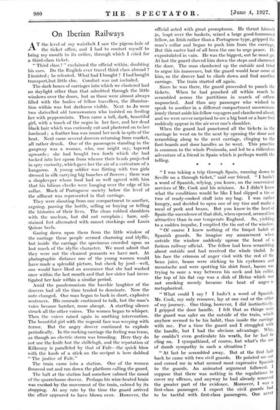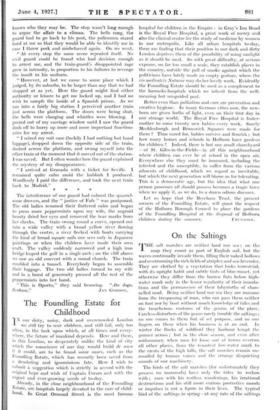On Iberian Railways
AT the level of my waistbelt I saw the pigeon-hole of the ticket office, and I had to contort myself to bring my mouth to its orifice, through which I cried for a third-class ticket.
" Third class ! " exclaimed the official within, doubting his ears. Do the English ever travel third class abroad ? I insisted ; he relented. What had I bought ? I had bought transport,but little else. Comfort was not included.
The dark boxes of carriages into which we clustered had no daylight other than that admitted through the little windows over the doors, but as those were almost always filled with the bodies of fellow travellers, the illumina- tion within was but darkness visible. Next to Jo were two shrivelled old townswomen who insisted on feeding her with peppermints. Then came a tall, dark, beautiful girl, with a touch of the negro in her face, and her dead black hair which was curiously cut and plastered on to her forehead ; a feather boa was round her neck in spite of the heat. Next came several drovers returning from market, all rather drunk. One of the passengers standing in the gangway was a woman, who, one might say, tapered upwards ; she had bought two fowls which she had tucked into her apron from whence their heads projected in spry curiosity, which gave her the air of a caricature of a kangaroo. A young soldier was flirting with two girls dressed in silk carrying big bunches of flowers ; there was a shopkeeper whose food had so well agreed with him that his bilious cheeks were hanging over the edge of his collar. Much of Portuguese society below the level of the affluent was represented in that carriage.
They were shouting from one compartment to another, arguing, passing the bottle, selling or buying or telling the histories of their lives. The clean rubbed shoulders with the unclean, but did not complain ; bare, soil- stained feet alternated with sunset stockings and Louis Quinze heels.
Gazing down upon them from the little window of the carriage these people seemed charming and idyllic, but inside the carriage the specimens crowded upon us lost much of the idyllic character. We must admit that they were not the cleanest peasants we have met. At photographic distance one of the young women would have made a splendid picture, but cheek by jowl—well, one would have liked an assurance that she had washed once within the last month and that her sister had inves- tigated her hair within a similar period.
Amid the pandemonium the bacchic laughter of the drovers had all the time tended to dominate. Now the note changed. One man began to bark in short, explosive sentences. His comrade continued to talk, but the man's voice became harsher, more abrupt. A startling silence struck all the other voices. The women began to whisper.
Then the voices raised again in soothing intervention. The beautiful girl with the riegroid face was weeping with terror. But the angry drover continued to explode periodically. In the rocking carriage the feeling was tense, as though an electric storm was brooding. Here they do not use the knife but the shillelagh, and the reputation of Kilkenny is paralleled by that of Fafe—the quick blow with the knob of a stick on the occiput is here dubbed " The justice of Fafe."
The train came into a station. One of the women flounced out and ran down the platform calling the guard.
The halt at the station had somehow calmed the mood of the quarrelsome drover. Perhaps his wine-heated brain was excited-by the movement of the train, calmed by its stopping.. At any rate by the time the guard arrived the affair appeared to have blown over. However, the official acted with great promptness. He thrust himself in, leapt over the baskets, seized a large good-humoured fellow, an Irish rather than a Portuguese type, gripped the man's collar and began to push him from the carriage. But this carter had of all been the one to urge peace. He expostulated in vain. He was the biggest, out he must go, At last the guard shoved him down the steps and slammed the door. The man clambered up the outside and tried to argue his innocence, but the guard would hear none of him, so the drover had to climb down and find another carriage. The train started off again.
Since he was there, the guard proceeded to punch the tickets. When he had punched all within reach he scrambled across the partitions in search of others unpunched.. And thus any passenger who wished to speak to another in a different compartment unceremon- iously thrust aside his fellow voyagers and clambered about, and we were never surprised to see a big boot or a bare foot suddenly appear in the air over one's shoulder.
When the guard had punctured all the tickets in the carriage he went on to the next by opening the door and scrambling along to the next carriage, clinging to the foot-boards and door handles as he went. This practice is common to the whole Peninsula, and led to a ridiculous adventure of a friend in Spain which is perhaps worth the telling.
" I was taking a trip through Spain, running down to Seville on a through ticket," said our friend. " I hadn't a word of Spanish, relying, you know, on the convenient services of Mr. Cook and his minions. As I didn't know what the conditions would be like I had slipped a tin or two of ready-cooked stuff into my bag. I was rather hungry, and decided to open one of my tins and make a meal of pork and beans. But you know in the heat of Spain the succulence of that dish, when opened, seemed less attractive than in our temperate England. So, yielding to a sudden impulse, I emptied the tin out of the window.
" Of course I knew nothing of the limpet habit of Spanish guards. So imagine my amazement when outside the window suddenly uprose the head of a furious railway official. The fellow had been scrambling about outside and had received the whole tinful. In his face the crimson of anger vied with the red of the bean juice, beans were sticking to his eyebrows and Moustache and were spotting his shirt front, bacon was trying to ooze a way between his neck and his collar, the top of his flat cap was a dish of Heinz which was not smoking merely because the heat of anger is metaphorical.
" What could I say ? I hadn't a word of Spanish. Mr. Cook, my only resource, lay at one end or the other of my journey. One thing, however, I did instinctively. I gripped the door handle. I felt that as things were the guard was safer on the outside of the train, which anyhow seemed to be his habit, than inside the carriage with me. For a time the guard and I struggled with the handle, but I had the obVious advantage. Wk., he couldn't even gesticulate his wrath, for he had to cling on. I sympathized, of course, but what's the use of dumb sympathy in such a situation ?
" At last he scrambled away. But at the first halt back he came with two civil guards. He pointed me out and cursed me in what seemed most expressiVe Spanish to the guards. An animated argument followed. I suppose that there was nothing in the regulations to cover my offence, and anyway he had already removed the greater part of the evidence. Moreover, I was a first-class passenger. I expect the civil guards had to be tactful with first-class passengers. One never knows who they may be The stop wasn't long enough to argue .the affair to a climax. The bells rang, the guard had to go back to his post, the policemen stared hard at Me so that they would be able to identify me in case I threw pork and misbehaved again. On we went.
" At every stop* the same scene repeated itself. No civil guard could be found who had decision enough to arrest me, and the train-guard's disappointed rage grew in intensity, in proportion to his failures to revenge the insult to his uniform.
" However, at last we came to some place which I judged, by its suburbs, to be larger than any that we had stopped at as yet. Here the guard might find either authority Or leisure to get me locked up, and 'I had no wish to sample the inside of a Spanish prison. As we ran into a fairly big station I perceived another train just across the platform. The doors were being shut, the bells were clanging and whistles were blowing. I peered out of my carriage window until I saw the guard dash off to hurry up more and more important function- aries for my arrest.
" I seized my suit case (luckily I had nothing but hand luggage), dropped down the opposite side of the train, dashed across the platform, and swung myself into the other train at the moment that it moved out of the station. I was saved. But I often wonder how the guard explained the mystery of my disappearance.
" I arrived at Granada with a ticket for Seville. I remained quite calm amid the hubbub I produced. Wordlessly I paid the difference, and took the next train back to Madrid."
The interference of our guard had calmed the quarrel- some drovers; and the " justice of Fafe " was postponed. The old ladies resumed their fluttered calm and began to press more peppermints upon my wife, the negroid beauty dried her Ryes and removed the tear marks from her cheeks. The train swung round a curve, opened out into a wide valley with a broad yellow river flowing through the centre, a river flecked with boats carrying the kind of broad square sails one sees only in Japanese paintings or when the .children have made their own craft. The valley suddenly narrowed and a high iron bridge leaped the gulf in a single arch ; on the cliff above we saw an old convent with a round church. The train rumbled • into a tunnel. Everybody began to assemble their luggage. The two old ladies turned to my wife and in a burst of generosity pressed all the rest of the peppermints into her hand.
" This is Oporto," they said beaming. "Ata dogo,







































 Previous page
Previous page